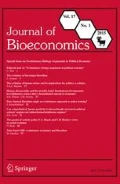References
Agency, E. E. (2009). Looking back on looking forward: A review of evaluative scenario literature, Technical Report No. 3. Copenhagen: European Environment Agency.
Anderson, A. (2005). An introduction to theory of change. Evaluation Exchange, 11, 12–19.
Arthur, W. B. (1988). Self-reinforcing mechanisms in economics. In P. W. Anderson, K. Arrow, & D. Pines (Eds.), The economy as an evolving complex system. Redwood City, CA: Addison-Wesley.
Beddoe, R., Costanza, R., Farley, J., Garza, E., Kent, J., Kubiszewski, I., Martinez, L., McCowen, T., Murphy, K., Myers, N., Ogden, Z., Stapleton, K., & Woodward, J. (2009). Overcoming systemic roadblocks to sustainability: The evolutionary redesign of worldviews, institutions, and technologies. Proceedings of the National Academy of Sciences of the United States of America, 106, 2483–2489.
Bohensky, E.L., Butler, J., Costanza, R., Bohnet, I., Delisle, A., Fabricius, K., Gooch, M., Kubiszewski, I., Lukacs, G., Pert, P. & Wolanski, E. (2011). Future makers or future takers? A scenario analysis of climate change and the Great Barrier Reef. Global Environmental Change, 21, 876–893.
Boyd, R., & Richerson, P. J. (2005). The origin and evolution of cultures. New York: Oxford University Press.
Carroll, K. M., Ball, S. A., Nich, C., Martino, S., Frankforter, T. L., Farentinos, C., Kunkel, L. E., Mikulich-Gilbertson, S. K., Morgenstern, J., Obert, J. L., Polcin, D., Snead, N., & Woody, G. E.; National Institute on Drug Abuse Clinical Trials Network. (2006). Motivational interviewing to improve treatment engagement and outcome in individuals seeking treatment for substance abuse: A multisite effectiveness study. Drug and Alcohol Dependence, 81, 301–312.
Costanza, R. (1987). Social traps and environmental policy. Bioscience, 37, 407–412.
Costanza, R. (2000). Visions of alternative (unpredictable) futures and their use in policy analysis. Conservation Ecology, 4, 5.
Costanza, R., Alperovitz, G., Daly, H., Farley, J., Franco, C., Jackson, T., Kubiszewski, I., Schor, J., & Victor, P. (2011). Building a sustainable and desirable economy-in-society-in-nature. New York: UN Department of Economic and Social Affairs.
Costanza, R., Graumlich, L., Steffen, W., Crumley, C., Dearing, J., Hibbard, K., Leemans, R., Redman, C., & Schimel, D. (2007). Sustainability or collapse: What can we learn from integrating the history of humans and the rest of nature? Ambio, 36, 522–527.
Costanza, R., Wainger, L., Folke, C., & Maler, K. G. (1993). Modeling complex ecological economic systems: toward an evolutionary, dynamic understanding of people and nature. Bioscience, 43, 545–555.
Diamond, J. (2006). Collapse: How societies choose to fail or succeed. New York: Viking Adult.
Heckbert, S., Isendahl, J., Gunn, S., Brewer, S., Scarborough, V., Chase, A. F., Chase, D. Z., Costanza, R., Dunning, N., Beach, T., Luzzander-Beach, S., Lentz, D., & Sinclair, P. (2013). Growing the ancient Maya social-ecological system from the bottom up. In J. Isendahl & D. Stump (Eds.), Applied archaeology, historical ecology and the useable past. Oxford: Oxford University Press.
Kahane, A. (2004). Solving tough problems: An open way of talking, listening, and creating new realities. San Francisco: Berrett-Koehler.
Kubiszewski, I., Costanza, R., Franco, C., Lawn, P., Talberth, J., Jackson, T., & Aylmer, C. (2013). Beyond GDP: Measuring and achieving global genuine progress. Ecological Economics, 93, 57–68.
Meadows, D. (2010). Leverage points: Places to intervene in a system. Solutions, 1, 41–49.
Millennium Ecosystem Assessment (MEA). (2005). Ecosystems and human well-being: synthesis. Washington, DC: Island Press.
Miller, W. R., & Rollnick, S. (2002). Motivational interviewing: Preparing people for change. New York: Guilford Press.
Nakićenović, N., & Swart, R. (2000). Emissions scenarios. Special report of the Intergovernmental Panel on Climate Change. Cambridge, UK: Cambridge University Press.
Ostrom, E. (2013). Do institutions for collective action evolve? J Bioecon. doi:10.1007/s10818-013-9154-8.
Peterson, G., Cumming, G., & Carpenter, S. (2003). Scenario planning: a tool for conservation in an uncertain world. Conservation Biology, 17, 358–366.
Raskin, P., Banuri, T., Gallopin, G., Gutman, P., Hammond, A., Kates, R., & Swart, R. (2002). Great transition: The promise of lure of the times ahead. Boston: Stockholm Environment Institute.
Ray, P. H. (2008). The Potential for a New, Emerging Culture in the U.S., Report on the 2008. American Values Survey. Institute for the Emerging Wisdom Culture: Wisdom University.
Ray, P. H., & Anderson, S. R. (2000). The cultural creatives: How 50 million people are changing the world. New York: Three Rivers Press.
Tainter, J. A. (1988). The collapse of complex societies. Cambridge: Cambridge University Press.
Wack, P. (1985). Scenarios: Uncharted waters ahead. Harvard Business Review, 63, 72–89.
Wilson, D. S., Hayes, S. C., Biglan, A., & Embry, D. D. (2013). Evolving the future: toward a science of intentional change. Behav Brain Sci (in press).
Wilson, D. S., & Wilson, E. O. (2007a). Rethinking the theoretical foundation of sociobiology. Quarterly Review of Biology, 82, 327–348.
Wilson, D. S., & Wilson, E. O. (2007b). Survival of the selfless. New Scientist, 196, 42–46.
Wollenberg, E., Edmunds, D., & Buck, L. (2000). Using scenarios to make decisions about the future: Anticipatory learning for the adaptive co-management of community forests. Landscape and Urban Planning, 63, 72–89.
Author information
Authors and Affiliations
Corresponding author
Rights and permissions
About this article
Cite this article
Costanza, R. A theory of socio-ecological system change. J Bioecon 16, 39–44 (2014). https://doi.org/10.1007/s10818-013-9165-5
Published:
Issue Date:
DOI: https://doi.org/10.1007/s10818-013-9165-5

